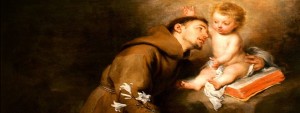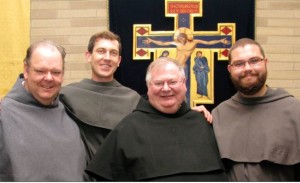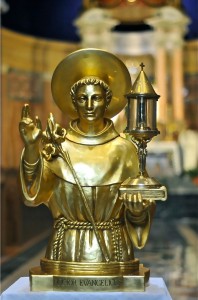 Today the Church celebrates the feast of one of the earliest Franciscan saints and a Doctor of the Church, Saint Anthony of Padua. More than aiding one to find lost articles, St. Anthony led a remarkable life that was spurred by an encounter he had with the Franciscan protomartyrs.
Today the Church celebrates the feast of one of the earliest Franciscan saints and a Doctor of the Church, Saint Anthony of Padua. More than aiding one to find lost articles, St. Anthony led a remarkable life that was spurred by an encounter he had with the Franciscan protomartyrs.
St. Anthony was born into a prominent family in Lisbon, Portugal in the year 1195. At the age of fifteen, he joined an Augustinian monastery where he studied intensely and was ordained a priest. His life was changed forever, however, when he encountered the bodies of the first Franciscan martyrs who had been tortured and beheaded in Morocco for their preaching.
Inspired to preach the Good News like the Franciscan protomartyrs, St. Anthony gained permission to leave the Augustinian Monastery and become a Franciscan. He then went to Morocco where he became ill and was forced to return to his homeland. On his return journey, however, strong winds forced him and his companions to land in Sicily where he eventually attended the Pentecost Chapter of Mats. Saint Anthony continued to live as an obscure Franciscan friar until he was asked to give a sermon at a meeting with a group of Dominicans. The depth of his knowledge and holiness shone throughout his speech and he was assigned to preach in northern Italy.
St. Anthony quickly became renowned throughout Christendom for his preaching which he nurtured through his deep prayer life and studies. He died at the age of 36 and was canonized in less than one year. Over three hundred years after his death, St. Anthony’s body was exhumed and his tongue was found to be incorrupt, a testament to his teachings.
 This early Franciscan saint is especially honored among the Conventual Franciscans who have custody of the basilica in Padua where his relics reside. They continue to promote education and study amongst friars especially those in formation like Br. Bernard Fonkalsrud OFM. Conv. who said, “the Conventual Franciscans have always encouraged our friars to seek to learn, inspired by ‘il Santo’ who was really the first Franciscan theologian and teacher. St. Francis entrusted St. Anthony to teach the friars, so long as it did not extinguish the spirit of prayer and devotedness. We can see products of this mindset through such examples as St. Bonaventure, Bl. Duns Scotus and St. Maximilian Kolbe.” Br. Bernard and the Conventual Franciscans continue to lead lives inspired by St. Anthony of Padua who himself was inspired by the holiness of earlier Franciscans.
This early Franciscan saint is especially honored among the Conventual Franciscans who have custody of the basilica in Padua where his relics reside. They continue to promote education and study amongst friars especially those in formation like Br. Bernard Fonkalsrud OFM. Conv. who said, “the Conventual Franciscans have always encouraged our friars to seek to learn, inspired by ‘il Santo’ who was really the first Franciscan theologian and teacher. St. Francis entrusted St. Anthony to teach the friars, so long as it did not extinguish the spirit of prayer and devotedness. We can see products of this mindset through such examples as St. Bonaventure, Bl. Duns Scotus and St. Maximilian Kolbe.” Br. Bernard and the Conventual Franciscans continue to lead lives inspired by St. Anthony of Padua who himself was inspired by the holiness of earlier Franciscans.

